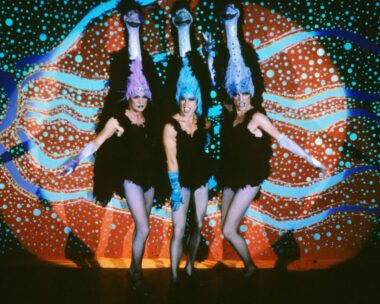Exclusive extract from monsoon by Do Morrissey (Published by Pan MacMillan).
Sandy pushed the send button and then, in the twilight, changed into cotton shorts, a T-shirt and running shoes and walked down to Hoan Kiem Lake in the centre of Hanoi to think about her future. She loved the tranquil scenery there – weeping willows, kapok trees, the clipped grass, the neat path that wound around the lake. Seats faced towards the islet on the southern end with its lonely-looking Tortoise Tower, topped by a red star. The Ngoc Son Temple on a pretty island at the Northern end was connected to a path by the Rising Sun red bridge.
When she’d first arrived in Hanoi she’d joined the crowds of locals exercising around the walk before work, intending to do the same. But the sights if hordes of energetic Vietnamese – even quite elderly men and women – meditating or exercising singly, in groups or with family members, was too diverting and she found herself stopping to watch and enjoy their activity rather than exercising herself. They were jogging, power walking doing all forms of aerobics, gymnastics dance and martial arts, tai chi or eve playing a spirited game of badminton. Ladies swinging their hips in a suggestive aerobics class and another group learning traditional fan dancing waved to Sandy, inviting her to join them. Sandy would laugh and wave back, concentrating on a fast walk around the perimeter of the lake, planning her day or letting her mind drift. Afterwards she would stop for a coffee at one of the trendy cafes that had sprung up in the park and in the Old Quarter. The French had left a legacy of wonderful baking and sometimes she had a delicious croissant or bought a warm baguette from one of the bread sellers who sold them from the back of his bicycle or from a basket carried on her head.
But as the lake area and the nearby Old Quarter became familiar to her, and she felt quite safe in the city, Sandy changed the walk around the lake to the early evening before dinner. She love the local food and ate out with friends and colleagues several nights a week. At lunchtime she bought a bowl of the famous Vietnamese pho soup from the side-walk kitchen run by Mrs. Han down from the HOPE offices. The tiny woman cooked over a small charcoal brazier, tossing in ingredients from the baskets that hung on either end of a long bamboo pole which she carried to the early morning markets to get vegetables and freshly made noodles. From sunrise to dark she crouched by her makeshift stove turning pho, the delicious traditional soup based on her grandmother’s secret recipe. Pho was once considered peasant food but had become iconic in Hanoi. Customers perched on short blue plastic stools around Mrs Han. Sandy had come to understand the Vietnamese obsession with this seemingly simple meal that was a tradition like chicken soup – a dish redolent with a nostalgia, comfort and identity.
A large pot of green tea was always ready to be sloshed into small beakers. It was a social exchange between those eating, those waiting and friends who came to gossip, squatting on their haunches around Mrs. Han. After school her young daughters sat beside her chopping vegetables on a small plastic board and washing plates and tea mugs in a large bowl.
Depending on her mood and the company, Sandy also ate in small cafes, hotels, or in tucked-away eateries known only to locals who made a habit of eating out on a regular basis. The food was fresh, cheap and tasty so Sandy avoided the more expensive restaurants catering to tourists and offering upmarket Vietnamese food, international cuisine and French wines.
She had her favourite hangouts but her “regular” spot was Barney’s Bar. It was run by a jovial American draft dodger who’d lived in Denmark and Canada before wandering around Asia. He’s hiked into Vietnam in the early 1980’s before tourism had been embraced by the communist government.
Barney Stuart had a loyal clientele of expats, Vietnamese business people and American and Australian ex-servicemen. Barney was the jovial hose and bartender, and always had a suggestion about what to try. Mrs. Lai Stuart, his wife, a pretty Vietnamese woman twenty years younger than her husband, supervised the cooking and menus. When she appeared from the kitchen she was always dressed in her long ao-dai, the traditional figure-hugging ankle-length dress with deep slits to the waist worn over loose flowing pants. It was quickly apparent that Lai was the business brains behind Barney’s, The two had been together for years and it was Lai who suggested that Barney open the bar in Hanoi with her as the official owner, as she could see that the influx of visitors and the loosening of the communist restrictions presented a good business opportunity.
Sandy jogged home from the lake, her route so familiar that she recognised the street hawkers on their patch, the shop owners and the itinerant businesses that set up to catch the night-time passers by. Families were out and about, children playing on the crowded footpaths as mothers shopped, prepared food or spread out trinkets, cigarettes, Tiger Balm, and other small souvenirs to sell to tourists. Coloured lights, strung haphazardly outside shops and along streets, twinkled, and candled flickered at outdoor altars. Incense sweetened the air. Sandy had overcome her initial shock at the chaotic traffic as wave after wave of bicycles, cyclos, motorcycles, scooters, cars and trucks in tooting congestion filled the streets. But as she ploughed into the mayhem of the endless withering traffic dragon to cross the street she still had no future plans,
Book Club questions
In spite of her father’s refusal to discuss his time in service during the war, Sandy embraces her life in Vietnam – is her interest piqued by his denial?
Anna has never been interested in her mother’s heritage until she goes to Vietnam and the country arouses an instictive sense of belonging. What is it about being in an unfamiliar place that seems so familiar?
For Tom, returning to see the new Vietnam is a way of making peace with the horrors of the war that he witnessed, while Sandy’s father wants no part of any reunion that will pull him back to the battlefields of Long Tan. Why is confronting the past cathartic for some, and horrific for others?


.png)


